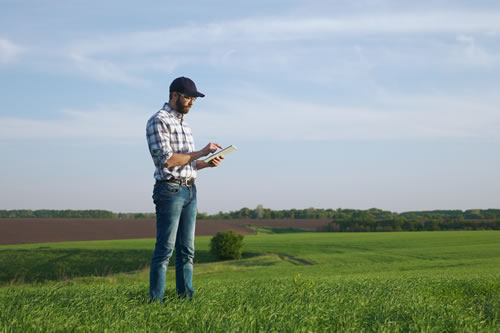It’s hard to think of too many things as downright American as Route 66. It connected us to the west, it joined rural and urban main streets, and it came to symbolize a post-war economic expansion that led to the longest sustained period of economic growth in our nation’s history.
Route 66 highlighted the significance of the automobile as a technical achievement, but it was also an imperative step for the freedom and mobility that goes hand-in-hand with the increasing accessibility of innovation.
Fast forward to our modern economy where entrepreneurship in general, and a technology start-up specifically, knows no geographical bias. Advancements in technology allows us to collaborate, to build, and to distribute without many of the traditional supply chain and logistics restraints. And yet, while we know that talent is well distributed, opportunity is lacking.
This is very personal to me. Not only because our corporate office sits on a piece of the original Route 66 in downtown Springfield, Missouri, but I strongly believe that the success of locally-grown companies is undeniably connected to the success of the communities in which they operate. So, when I launched CellARide in 2010, I knew I wanted to build a technology company, anchored in the Midwest, that would eventually do business with the largest automakers and marketers in the world. And that’s exactly what we did.
Navigating Capital Outside the Coastal Tech Hubs
Investing in any early stage company is a numbers game. The win rate is low, the competition is fierce, and the noise level is high. But for those few companies that succeed, the returns typically justify the risk.
Historically, the overwhelming amount of venture capital and equity funding for technology upstarts has been located in the San Francisco Bay area, New York, and Boston. These areas have developed a critical mass of capital, companies, and successes. It is not that ideas coming from those regions are inherently superior, but they do have a depth of experience and resources to make it difficult to compete with.
In the last decade or so, we’ve seen some other hotspots gain momentum. Austin, Seattle, Boulder, and Provo are a few examples of communities showing a concerted and sustained effort to mobilize investment and encourage high-growth companies to play a vital role in their long-term economic development strategy.
Great companies can start and scale anywhere. That is the philosophy we’ve taken with our company. We’ve intentionally cultivated regional investors who share our interest in advancing opportunities in our own backyard. In doing so, we’ve operated with discipline in raising funds and have grown with highly capital-efficient operations. And as more and more companies and communities work together to foster entrepreneurial and investment ecosystems, we’ll see geography play a diminished role in determining the success or failure of new companies.
Our Company Development Roadmap
Over the last few years, I’ve had to establish our own company development roadmap in order to know what stage CellARide is in at any given time. It’s less of a “TomTom” approach and more of a set of guideposts and landmarks. I’ve recently coined the phrase “The Five Speeds of Innovation” and it really helps us remain focused on the road ahead.
- 1st gear: IDEA – It’s a bit cliche, but there has to be a better way. The idea is formed as a solution to a problem. It can be simple or complex, but it should address and relieve a pain point for the consumer. My idea for CellARide was, I simply wanted to “text the car” instead of talking to a salesperson.
- 2nd gear: PRODUCT – Also known as, Minimum Viable Product (MVP). Develop a functioning solution. Test. Refine. Repeat. An MVP should demonstrate the value and utility of your idea. At this point it should be refined enough to market test, but flexible enough to modify quickly and redeploy for feedback. I utilized my Computer Information Systems degree from Missouri State University to engineer the initial MVP offering for CellARide.
- 3rd gear: BUSINESS – This is what I would consider the proof of concept phase or post-revenue stage where market validation should be achieved. Sales channels will be developed, clients engaged, and marketing will ramp up. It’s the stage where I realized I wasn’t the only one who would use or buy the product that I was trying to sell.
- 4th gear: COMPANY – The move from Founder to CEO was a tough one for me. Your role will need to shift from the exciting and fun R&D process to now scaling a refined business model. Company processes and long-range planning will need to be implemented and hiring “the team” begins.
- 5th gear: EXIT – The exit stage will mean different things to different companies. But regardless of what it entails the exit should be driven by protecting shareholder value and maintaining client relations. My goal has always been to drive CellARide as far as we can, with the intention of plugging it into an infrastructure that can take the wheel and speed off into the sunset.
Enjoy the Process
If you are like me, the process is part of the fun. It doesn’t mean it is easy. In my experience the challenges make the wins more enjoyable. And the amount of personal investment and emotional fortitude required, make the setbacks particularly painful.
I get asked a lot about the challenges of building a tech company in flyover country, and I respond honestly. It is one of the most difficult things I have ever done, but there is light at the end of the tunnel. Regardless of where you start, good ideas and disciplined companies can be successful.
In order to be successful though, you’ll have to carefully navigate “The Five Speeds of Innovation” roadmap laid out above. But no worries, I’ve got you covered there too. I crafted the 3 P’s to Innovation Success.
- PASSION – “You have to be burning with an idea, or a problem, or a wrong that you want to right. If you’re not passionate enough from the start, you’ll never stick it out.” – Steve Jobs. CellARide is going on its 10th year in business. Passion has been a significant factor in our longevity.
- PERSISTENCE – CellARide’s B2B sales model is not for the faint of heart. Long sales cycles require massive amounts of “polite persistence”. We’ve had deals that took 675 days from initial contact to deal close, with many “No thanks” along the way.
- Ability to PIVOT – In the tech space, most founders will agree that the market typically reacts to an initial idea and almost always the successful entrepreneurs will pivot or adjust to capitalize on the market opportunities. CellARide’s My Car Recall Concierge platform was that pivotal product for us.
Right now, I’m laser focused on the road ahead. If our technology innovation approach helps pave the way for others who follow in our Midwest communities, then it will be well worth the drive.
















Comments are closed.